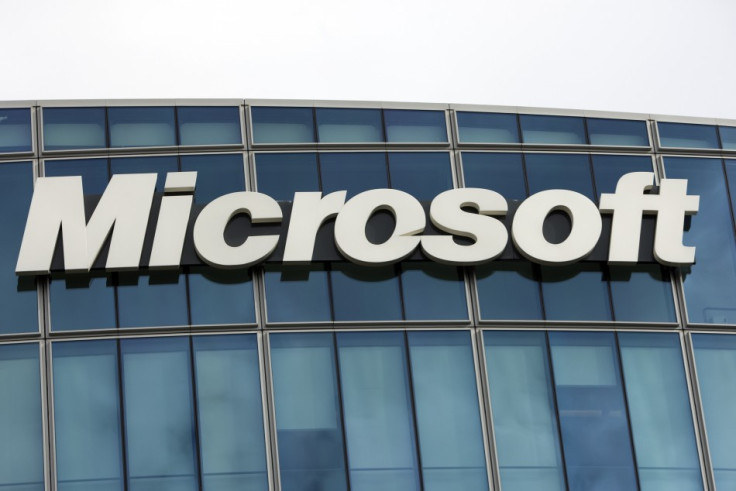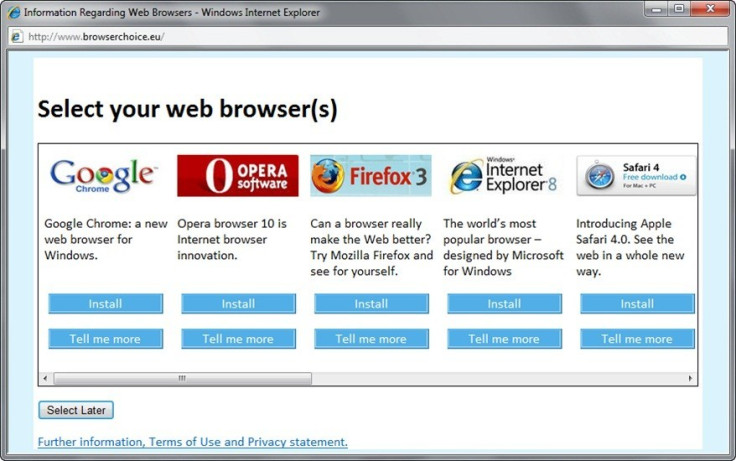Microsoft Fined £484m by EU for Breaching Antitrust Deal [VIDEO]
Microsoft has been fined €561m (£484m) by the European Union for failing to offer Windows 7 users a choice of web browser, instead providing the company's own Internet Explorer by default.

In 2009 the EU ordered Microsoft to offer users a choice of browsers the first time they boot up a new Windows computer, but it was later found that for more than a year the Windows 7 operating system included no such choice.
EU Competition Commissioner Joaquin Almunia said the fine was imposed due to Microsoft committing a "very serious infringement" by first offering then removing a browser choice in Windows 7.
"Such a breach is of course very serious whether intentional or not and calls for sanction," Almunia said, adding that Microsoft was granted some mitigating circumstances as it had cooperated with the EU during its investigation.
Almunia also said that the market domination of Internet Explorer and Windows when the investigation started in 2009 caused "very serious" concerns that rival browsers were being unfairly kept out of the market.
"Lack of compliance is a serious breach of EU law, companies must do what they have committed to do or face the consequences. We hope this decision makes companies think twice before doing something similar."
Microsoft said in a statement: "We take full responsibility for the technical error that caused this problem and have apologised for it. We provided the Commission with a complete and candid assessment of the situation, and we have taken steps to strengthen our software development and other processes to help avoid this mistake - or anything similar - in the future."

Service Pack 1
The ability to choose from a range of web browsers - such as Firefox, Chrome, Opera and Safari - was introduced by Microsoft in December 2009 and was due to run until 2014, but it was not present in the Service Pack 1 upgrade of Windows 7.
The choice was missing from the launch of SP1 in February 2011 until July 2012, during which time Microsoft estimates the update was installed on 28 million computers in an apology published last July; this estimate of affected users was later lowered by the EU to 15.3 million.
Microsoft stated in its apology that it had fallen short in its responsibility to offer a choice of internet browsers. "Due to a technical error, we missed delivery of the BCS [Browser Choice Screen] software to PCs that came with the Service Pack 1 update to Windows 7."
The apology continued to explain that, although Microsoft thought the BSC software was included in Service Pack 1, it learned months later that it was missing, after the free update had been installed by millions Windows 7 users.
Bracing for the fine, which could have been as high as 10 percent of the company's 2012 revenue, or £4.9bn, Microsoft's board cited it as one of the reasons for giving CEO Steve Ballmer only half of his expected bonus for 2012.
This isn't the first time Microsoft has been fined by the EU on grounds of anti-competitive practice. The computer giant has already been fined £1.4bn to date for not providing data to rivals for fair prices and for tying its media player to the Windows operating system.
Microsoft's share of the browser market has roughly halved since 2008 to 24 percent in January, behind market leader Google Chrome at 35 percent and Mozilla Firefox at 29 percent.
© Copyright IBTimes 2025. All rights reserved.





















